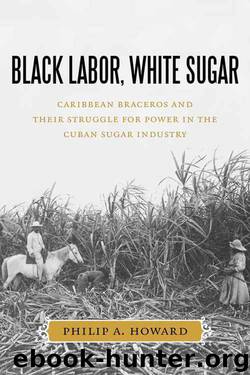Black Labor, White Sugar: Caribbean Braceros and Their Struggle for Power in the Cuban Sugar Industry by Philip A. Howard

Author:Philip A. Howard [Howard, Philip A.]
Language: eng
Format: epub
Publisher: LSU Press
Published: 2015-06-14T23:00:00+00:00
The braceros’ marginal position, which the sugar and financial crisis intensified during the first half of the 1920s, contributed to the formation of a more radical consciousness. Their relations with the mills and the cane farmers resulted in numerous slights, injuries, and even deaths. These became, to borrow from Ken Post, the “substances” that led to a “class consciousness,” which in time took “collective form.” In these conditions, workers came to see themselves as “things, to be used or not according to the whims of others.”68 The braceros’ evolving acceptance of the option of collective action stemmed not only from their self-conceptualization of becoming things, not people, but also from the indifference that the companies and farmers displayed after 1920. When the employers stopped paying, feeding, and lodging their field workers, they repudiated the agreement based upon the “principles of inequality” expressed in the braceros’ work contracts, the terms of which were understood by the workers themselves as legitimate causes and grounds for their subordination. The mills’ malfeasance gave the workers the right to challenge the power of the owners, managers, and farmers to dominate them.69 Hugh Buchanan, a Jamaican bracero who lived and worked in Cuba during the sugar crisis of the early 1920s, and who in the late 1930s helped direct the labor protest movement in Jamaica, carried this conviction from Cuba when he stated that the organization of labor occurred when the elites lost their legitimacy to rule by not addressing “the desperate conditions of the poor.”70
How the braceros were treated, humiliated, and dismissed after 1920 assisted the anarcho-syndicalists in fostering this consciousness. When they introduced the braceros to the doctrine of “internationalism” and explained that it was essential to mitigate the damaging effects of the segmented racial and color labor system that the companies employed to divide and control their work force, the braceros were receptive to their organizing activities.
Social revolutions are always based on ideas of social and economic equality or internationalism. This guiding principle led to the establishment of racially inclusive labor syndicates. In fact, racial and ethnic tolerance had become the dogma of the Spanish chapter of the International Brotherhood that met as early as 1870 in Barcelona. Meeting a year after Bakunin helped found the International Brotherhood, members of the International Workingmen’s Association, as it was called, opened their conference with the solemn oath to work for the “complete emancipation of the proletariat, and the absolute extirpation of all injustices which have ruled and still rule . . . the millions of workers, white slaves and black slaves.”71 It is important to remember that during the sugar workers’ strike of 1902 around Cruces, in Las Villas Province, as we saw in chapter 1, the mulatto leader of the Gremio de Braceros de Lejas, Evaristo Landa, expressed this notion of internationalism when he told his members that they could not question a worker’s place of birth, and that what mattered most was the organization of all those who labored to reduce their poverty.72
It
Download
This site does not store any files on its server. We only index and link to content provided by other sites. Please contact the content providers to delete copyright contents if any and email us, we'll remove relevant links or contents immediately.
| Arms Control | Diplomacy |
| Security | Trades & Tariffs |
| Treaties | African |
| Asian | Australian & Oceanian |
| Canadian | Caribbean & Latin American |
| European | Middle Eastern |
| Russian & Former Soviet Union |
The Secret History by Donna Tartt(19053)
The Social Justice Warrior Handbook by Lisa De Pasquale(12187)
Thirteen Reasons Why by Jay Asher(8894)
This Is How You Lose Her by Junot Diaz(6877)
Weapons of Math Destruction by Cathy O'Neil(6267)
Zero to One by Peter Thiel(5787)
Beartown by Fredrik Backman(5737)
The Myth of the Strong Leader by Archie Brown(5500)
The Fire Next Time by James Baldwin(5431)
How Democracies Die by Steven Levitsky & Daniel Ziblatt(5216)
Promise Me, Dad by Joe Biden(5144)
Stone's Rules by Roger Stone(5081)
A Higher Loyalty: Truth, Lies, and Leadership by James Comey(4954)
100 Deadly Skills by Clint Emerson(4921)
Rise and Kill First by Ronen Bergman(4780)
Secrecy World by Jake Bernstein(4741)
The David Icke Guide to the Global Conspiracy (and how to end it) by David Icke(4709)
The Farm by Tom Rob Smith(4502)
The Doomsday Machine by Daniel Ellsberg(4484)
